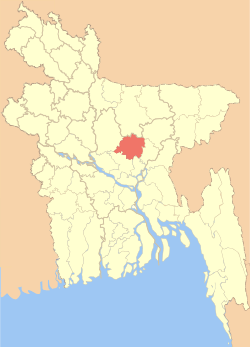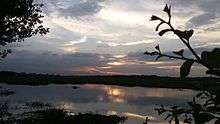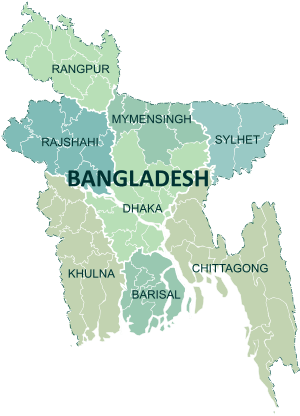Gazipur District
| Gazipur গাজীপুর জেলা | |
|---|---|
| District | |
 Location of Gazipur in Bangladesh | |
| Coordinates: BD 24°00′N 90°26′E / 24.00°N 90.43°ECoordinates: BD 24°00′N 90°26′E / 24.00°N 90.43°E | |
| Country |
|
| Division | Dhaka Division |
| Area | |
| • Total | 1,741.53 km2 (672.41 sq mi) |
| Population (2011 census) | |
| • Total | 3,403,912 |
| • Density | 2,000/km2 (5,100/sq mi) |
| Literacy rate | |
| • Total | 36% |
| Time zone | BST (UTC+6) |
| Postal code | 1712 |
| Coast | 5 km (3.1 mi) |
| Website |
gazipur |
Gazipur District (Bengali: গাজীপুর জেলা) is a district of Dhaka Division in Bangladesh. It has an area of 1741.53 km2.[1]
Gazipur (Town) has 9 wards and 31 mahallas. The area of the town is 49.32 km2. The town's population is 123,531; male 52.52%, female 47.48%; density is 2,505 per km2. Establishments such as Islamic University of Technology, Bangabandhu Sheikh Mujibur Rahman Agricultural University (BSMRAU), Bangladesh Rice Research Institute (BRRI), Bangladesh Agricultural Research Institute (BARI), Dhaka University of Engineering and Technology, and others are located here.
Banks
There is head office of a national strong bank which is Progoti Co-operative Land Development Bank Limited (known as Progoti Bank) in Kapasia Upazila Sadar, a small, beautiful town nearly 30 km north of Gazipur City that specializes in originating and/or servicing mortgage loans, is said that Progoti Bank is father of land development bank in the country. Without it, branches of banking institutions in the area include:
- Sonali Bank
- Agrani Bank
- Grameen Bank
- Rupali Bank
- Islami Bank Bangladesh Ltd
- Bank Asia Limited
- Dutch Bangla Bank
- National Bank (Bangladesh)
- Mutual Trust Bank Limited
- BRAC Bank Limited
- ISLAMI Bank Limited
- Eastern Bank Ltd (Bangladesh)
- Trust Bank Limited (Bangladesh)
- NRB Bank
- Jamuna Bank Limited
Points of interest



- Bhawal National Park
- Nandan Park
- Ansar VDP Academy
Administration
Sub-districts
Gazipur district was established in 1984. It has 6 upazilas, 46 union Union Parishads, 710 mouzas, 2 municipalities and 1163 villages.
The six upazilas (previously known as "thanas") in Gazipur are:
Thana and subdistricts of Gazipur
Gazipur District is divided into the following upazilas:
- Townships:
Transport
- Dhaka-Tongi diversion road connects Gazipur with Dhaka.
- There are seven railway stations in the Gazipur district.
Education
There are five universities in Gazipur: Islamic University of Technology, Bangabandhu Sheikh Mujibur Rahman Agricultural University (formerly the Institute of Postgraduate Studies on Agriculture), Dhaka University of Engineering and Technology, Bangladesh Open University and Bangladesh National University.
There are two masters level colleges in the district: Bhawal Badre Alam Government College and Tongi Government College.[4]
There are 19 degree colleges in the district. Honors level ones are: Jatir Pita Bangabandhu Degree College, Kaligonj Sramik College, Kapasia Degree College (founded in 1965), and Kazi Azim Uddin College. According to Banglapedia, Sreepur University College, founded in 1968, is a notable pass level one.[1][5][6]
Notable higher secondary schools include M. E. H. Arif College, Taraganj H. N. Higher Secondary School (founded in 1919), and Tongi Pilot School & Girls' College.[1][7]
According to Banglapedia, Bhringoraj Talebabad High School, founded in 1928, Kaliganj R.R.N. Pilot Government High School (1889), Kaoraid Kali Narayan High School (1929), Rani Bilasmoni Government Boys' High School (1905), and Saint Nicholas High School (1920) are notable secondary schools.[1]
The madrasa education system includes 26 fazil and 3 kamil madrasas.[8][9]
Computer Education
Media
Print media
- Prothom Alo (national)
- The Daily Kaler kantho (national)
- The Daily Samakal (national)
- The Daily Janakhanta (national)
- The Daily Jugantar (national)
Online Daily
- Gazipur Tribune (local)
- gazipur24 (local)
- Gazipur Times (local)
- Kapasia, Gazipur (local)
Telecommunications
- Airtel, BTCL, Bangla Link, Teletalk, Grameen Phone, Robi etc.
Satellite Television
See also
References
| Wikimedia Commons has media related to Gazipur District. |
| Wikivoyage has a travel guide for Gazipur District. |
- 1 2 3 4 Md Farid Uddin Ahmed (2012). "Gazipur District". In Islam, Sirajul; Jamal, Ahmed A. Banglapedia: National Encyclopedia of Bangladesh (Second ed.). Asiatic Society of Bangladesh.
- ↑ AL men appointed administrators, The Daily Star, December 16, 2011
- ↑ "10 districts get new DCs". bdnews24.com. 16 January 2012.
- ↑ "Masters Level College". Ministry of Education. Retrieved July 15, 2014.
- ↑ "Degree (Honors) Level College". Ministry of Education. Retrieved July 15, 2014.
- ↑ "Degree (Pass) Level College". Ministry of Education. Retrieved July 15, 2014.
- ↑ "School & College". Ministry of Education. Retrieved July 15, 2014.
- ↑ "Fazil Madrasha". Ministry of Education. Retrieved July 15, 2014.
- ↑ "Kamil Madrasha". Ministry of Education. Retrieved July 15, 2014.
